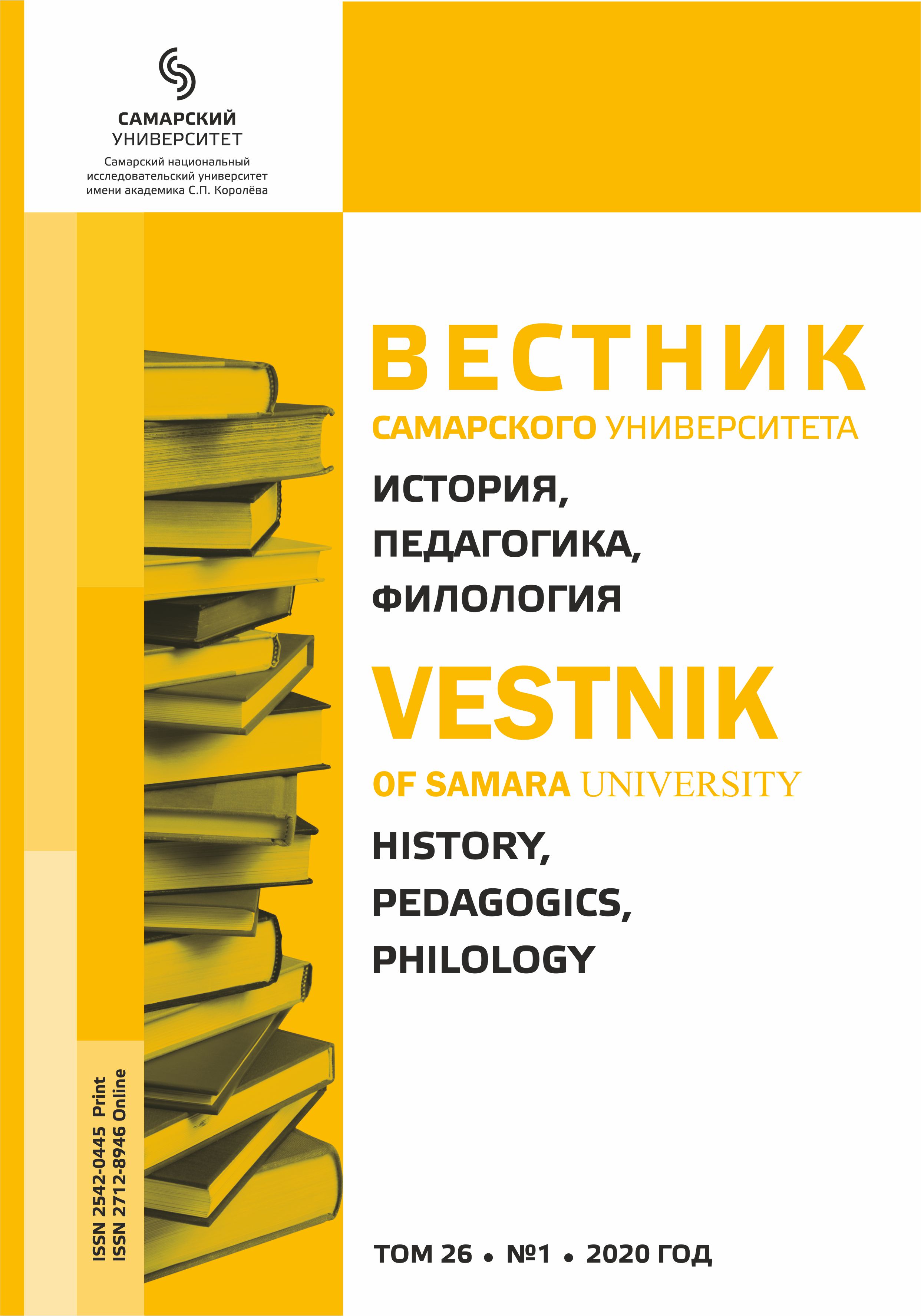Эпистолярное наследие как источник по изучению проблем трансформации коллективной памяти
- Авторы: Наумов С.С.1
-
Учреждения:
- Омский государственный университет имени Ф.М. Достоевского
- Выпуск: Том 26, № 1 (2020)
- Страницы: 55-64
- Раздел: Статьи
- URL: https://journals.ssau.ru/hpp/article/view/7727
- DOI: https://doi.org/10.18287/2542-0445-2020-26-1-55-64
- ID: 7727
Цитировать
Полный текст
Аннотация
памяти жителей крупных сибирских городов (Омск и Новосибирск) в условиях демократических преобразований в стране и обществе в 1985–2000 гг.; для реализации этой цели автор поставил следующие задачи: установить факторы эволюции коллективной памяти, возникшие в рассматриваемый период; выявить новые особенности трансляции памяти о прошлом; раскрыть этапы и содержание рефлексии жителей крупных городов Западной Сибири на тему исторического прошлого, учитывая трансформации, происходившие в сфере коллективной памяти. Проблемы изучения коллективной памяти современного российского общества, политика памяти, факторы манипуляции историческим сознанием не первый год вызывают острые научные и публицистические дискуссии. Информативным в силу своей массовости источником по изучению трансформаций коллективной памяти являются письма граждан как отклик на различные опубликованные материалы, касающиеся истории страны. Актуальность данной темы обоснована необходимостью понимания процессов, в результате которых формировались представления жителей постсоветской России о прошлом. Научная новизна заключается в анализе ранее не востребованных архивных источников, иллюстрирующих процесс эволюции взглядов «простых» людей на общероссийскую историю и непосредственно историю Сибири. Исследование выполнено в рамках проблемного поля memory studies, которому свойственны разработки новых междисциплинарных методов и подходов при изучении специфических особенностей коллективной памяти, а также практик исторической политики; были также использованы традиционные ретроспективный и генетический методы исторического исследования. На основе обращения к омским и новосибирским материалам делается вывод о схожести актуализированных в годы перестройки и постперестроечный период сюжетов на тему коллективной памяти. В первую очередь это события революции и Гражданской войны в России, события периода 1920–1930-х гг., Великой Отечественной войны, но вместе с тем нехарактерное для коллективных представлений о прошлом «до 1985 года» обращение к дореволюционной истории, а также высокая степень акцентирования внимания на проблемах современности в их «привязке» к историческим фактам. Трансформации представлений о прошлом в 1985–1990-е гг. характеризуются как глобальные, послужившие толчком к пробуждению гражданской активности общества. Определяются этапы усиления и ослабления интереса людей к историческим сюжетам в зависимости от различных политических и социально-экономических факторов.
Об авторах
С. С. Наумов
Омский государственный университет имени Ф.М. Достоевского
Автор, ответственный за переписку.
Email: morenov@ssau.ru
ORCID iD: 0000-0002-7256-4708
аспирант кафедры современной отечественной истории и историографии
Список литературы
- Confino 1997 – Confino A. Collective Memory and Cultural History: Problems of Method // The American Historical Review. 1997. Vol. 102. No. 5. P. 1386–1403. Available at: http://warwick.ac.uk/fac/cross_fac/ehrc/events/memory/confino_collective_memory_and_cultural_history.pdf.
- Gedi, Elam 1996 – Gedi N., Elam Y. Collective memory – What is it? // History and memory. 1996. Vol. 8. No 1. P. 30–50. URL: http://www.humanrightscolumbia.org/biblio/collective-memory-what-it.
- Olick, Sier, Wuestenberg 2017 – Olick J., Sier A., Wuestenberg J. The memory studies association: Ambitions and an invitation // Memory studies. 2017. Vol. 10. No. 4. P. 490–494. DOI: http://doi.org/10.1177/1750698017721792.
- Radstone 2008 – Radstone S. Memory studies: For and against // Memory Studies. 2008. Vol. 1. No. 1. P. 31–39. DOI: http://doi.org/10.1177/1750698007083886.
- Ассман 2014 – Ассман А. Длинная тень прошлого: Мемориальная культура и историческая политика. Москва: Новое литературное обозрение, 2014. 328 с. URL: http://docplayer.ru/26260948-Aleyda-assman-dlinnaya-ten-proshlogo-memorialnaya-kultura-i-istoricheskaya-politika.html.
- Ассман 2004 – Ассман Я. Культурная память: Письмо, память о прошлом и политическая идентичность в высоких культурах древности. Москва: Языки славянской культуры, 2004. 368 с. URL: http://b-ok2.org/book/3061324/469468.
- Кобак 2012 – Кобак И.В. Письма как исторический источник: задачи и приемы изучения // Вестник Санкт-Петербургского университета. Серия 2. История. 2012. Вып. 2. С. 142–148. URL: http://cyberleninka.ru/article/n/pisma-kak-istoricheskiy-istochnik-zadachi-i-priemy-izucheniya/viewer.
- Козлова, Сандомирская 1996 – Козлова Н.Н., Сандомирская И.И. «Я так хочу назвать кино». «Наивное письмо»: опыт лингво-социологического чтения. Москва: Гнозис, Русское феноменологическое общество, 1996. 255 с. URL: http://www.a-z.ru/women/texts/kozlovar-1.htm.
- Кознова 2003 – Кознова И.Е. Историческая память и основные тенденции ее изучения // Социология власти. 2003. № 2. С. 23–34. URL: http://elibrary.ru/item.asp?id=9231878.
- Леонтьева 2011 – Леонтьева О.Б. Историческая память и образы прошлого в российской культуре XIX – начала XX вв. Самара: ООО «Книга», 2011. 448 с. URL: http://rushist.samsu.ru/books1/Leontieva_Memory.pdf.
- Письма об истории и для истории 2014 – Письма об истории и для истории. 1988–1990 годы: коллект. монография / Е.Г. Боярских, Е.Н. Иванова, Т.П. Кальянова [и др.]. Иркутск, 2014. 209 с. URL: http://hist.isu.ru/ru/science/docs/2016/monography.pdf.
- Репина 2003 – Репина Л.П. Культурная память и проблемы историописания (историографические заметки). Москва: ГУ ВШЭ, 2003. 44 с. URL: http://www.hse.ru/data/2013/03/23/1295211049/WP6_2003_07.pdf.
- Савельева, Полетаев 2005 – Савельева И.М., Полетаев А.В. «Историческая память»: к вопросу о границах понятия // Феномен прошлого. Москва: ГУ ВШЭ, 2005. С. 170–220. URL: http://istorex.ru/page/saveleva_im_a_v_poletaev_av_istoricheskaya_pamyat_k_voprosu_o_granitsakh_ponyatiya.
- Сафронова 2019 – Сафронова Ю.А. Историческая память: введение: учебное пособие. Санкт-Петербург: Издательство Европейского университета в Санкт-Петербурге, 2019. 220 с. URL: http://eupress.ru/books/index/item/id/315.
- Черников 2016 – Черников П.Ю. Проблема изучения исторической и социальной памяти // Вестник Российского экономического университета имени Г.В. Плеханова. 2016. № 5. С. 189–194. URL: http://elibrary.ru/item.asp?id=27204637.
- Шуб 2018 – Шуб М.Л. Культурная память: сущностные особенности и социокультурные практики бытования. Челябинск: ЧГИК, 2018. 303 с. URL: http://elibrary.ru/item.asp?id=36412299.
Дополнительные файлы













